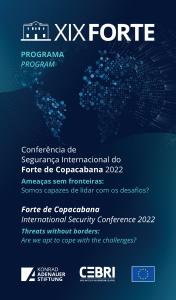Event
Details
Threats without borders: Are we apt to cope with the challenges?
On rare occasions in recent history have we had such a need to address global security. The current international context shows how new security threats disregard geographical barriers. In light of rising geopolitical tensions in Europe, exacerbated by the Russian invasion of Ukraine in February 2022, and the Covid-19 pandemic over the last two years, there is a clear need for greater mobilization of the international community in favour of multilateralism and joint engagement on security and defense issues.
With the increase in global instability in the face of the Russian military aggression against Ukraine, some threats must be tackled jointly from the security point of view, in order to guarantee a response that is not only more effective, but also encompasses the secondary impacts of recent events. Issues such as energy sufficiency, food security, cyber security, as well as the effects of the climate crisis are directly impacted by the current situation.
There are numerous challenges that countries and multilateral organizations need to address: (illegal) migration, violence, forced displacement, racism against refugees, evacuations, fights over energy sources, diseases, cyber-attacks and other. These threats are part of the results of socio-environmental, climatic and technological imbalances. Such imbalances intensify hunger, amplify inequalities in access to basic resources and health, loss of biodiversity and the ability to provide security and protection.
This year, the theme of the event will therefore be "Threats without borders: are we apt to cope with the challenges?", on 30 June and 1 July 2022. The conference aims to promote debates focused on possible solutions for the mitigation of global security problems, which go beyond the limits of traditional borders, as well as to stimulate closer cooperation between Europe and Latin America throughout the discussions in four thematic panels, entitled:
- Climate change and energy crisis: the new battlegrounds revisited
- Basic livelihoods at stake: water and food security
- Covid-19: one for all and all for one? Curbing threats arising from the pandemic
- Cooperation for technological security: artificial intelligence and cyberwar
In addition to discussing the direct impact of armed conflict, it is essential to have a debate on the possibilities and risks that are at stake in the current international security context. It is with this objective in mind that the Forte de Copacabana International Security Conference presents its 19th edition.
Register by clicking HERE.
Download the complete programme by clicking here.
30 JUNE 2022
Welcome | 9:00-9:05 (Brasilia Time) | 14:00-14:05 (Brussels time)
Ariane Costa
Master of Ceremonies, Project Coordinator of the Konrad Adenauer Foundation (KAS) in Brazil
Institutional Opening | 9:05-9:20 (Brasilia Time) | 14:05-14:20 (Brussels time)
Anja Czymmeck
Director of Konrad Adenauer Foundation (KAS) in Brazil
André Clark
Advisory Board at CEBRI and Senior Vice President for the Siemens Energy Hub in Latin America and General Manager of Siemens Energy Brazil
Ignacio Ybáñez
Ambassador of the European Union to Brazil (EUDEL)
OPENING PANEL | 9:20-10:30 (Brasilia Time) | 14:20-15:30 (Brussels time)
Raul Jungmann
CEO of the Brazilian Mining Association (IBRAM), Brazilian Former Minister of Defense
Roderich Kiesewetter
Col. (red), MP and spokesperson for Crisis Prevention to the CDU/CSU Parliamentary Group in the Deutscher Bundestag
Pawel Herczynski
Managing Director for CSDP and Crisis Response at the European External Action Service (EEAS)
Moderação: Leila Sterenberg, Anchor and senior reporter at GloboNews Brazil
PANEL 1 | 10:45-12:00 (Brasilia Time) | 15:45-17:00 (Brussels time)
Climate change and the energy crisis: new battlefields revisited
Christoph Heusgen
Chairman of the Munich Security Conference
Brigitte Collet
Ambassador of France to Brazil
Rodolfo Lacy
Director for Climate Action and Environment for Latin America of the Organisation for Economic Co-operation and Development (OECD) and Special Envoy on Climate Matters to the United Nations (UN)
Moderator: Jennifer May, Ambassador of Canada to Brazil
01 JULY 2022
Welcome | 9:00-9:05 (Brasilia Time) | 14:00-14:05 (Brussels time)
Ariane Costa
Master of Ceremonies, Project Coordinator of the Konrad Adenauer Foundation (KAS) in Brazil
PANEL 2 | 9:05-10:00 (Brasilia Time) | 14:05-15:00 (Brussels time)
Basic livelihood at stake: water and food security
Michael Köhler
Acting Director-General of the Directorate-General of the European Commission for European Civil Protection and Humanitarian Aid Operations (ECHO)
Rafael Zavala Gomez Del Campo
Representative of the Food and Agriculture Organization (FAO) of the United Nations (UN) in Brazil
Stela Goldenstein
Brazil National Coordinator of the 2030 Water Resources Group (2030 WRG)
Moderação: Henning Speck, National Security Advisor CDU/CSU Parliamentary Group, Deutscher Bundestag
PANEL 3 | 10:00-11:05 (Brasilia Time) | 15:00-16:05 (Brussels time)
Covid-19: one for all and all for one? Combatting threats arising from the pandemic
Renzo Console
Deputy Head of the Division - Economic Issues and Global Health of the European External Action Service (EEAS)
Fabricio Cabrera Ortiz
Head of the Department of the Advanced Military Studies Course (CAEM) and Comprehensive National Defense Course (CIDENAL) at the General Rafael Reyes Prieto War College (ESDEG)
Carlo Masala
Professor at the University of the German Armed Forces
Margareth Dalcolmo
Researcher at the Oswaldo Cruz Foundation (Fiocruz) and Pulmonologist
Moderação: Adriana Aparecida Marques, Professor at the Federal University of Rio de Janeiro (UFRJ)
PANEL 4 | 11:20-12:15 (Brasilia Time) | 16:20-17:15 (Brussels time)
Cooperation for technological security: artificial intelligence and cyberwar
Paulo Carvalho
Major General in the Brazilian Army Reserve
Björn Taube
German Defence Attaché at the Embassy in Brasília
Peter van Praagh
President of the Halifax International Security Forum
Sabrina Medeiros
Professor at the Lusophone University of Lisbon and Researcher for the National Defence Institute of Portugal
Moderação: Helen Popp, Policy Officer for Cyber Security of Division Security and Defence Policy at the European External Action Service (EEAS)
CLOSING | 12:15-12:30 (Brasilia time) / 17:15-17:30 (Brussel time)
Anja Czymmeck
Director of Konrad Adenauer Foundation (KAS) in Brazil
José Alfredo Graça Lima
Vice-Chairman of the Brazilian Center for International Relations (CEBRI)
Ignacio Ybáñez
Ambassador of the European Union to Brazil (EUDEL)
Register HERE.
The Konrad Adenauer Foundation
The Konrad Adenauer Foundation (KAS) is an independent, non-profit German political foundation which acts nationally and internationally for peace, justice and freedom. Our main mission is to defend democracy and promote the social market economy based on the values of Christian democracy. In addition, we seek to strengthen transatlantic relations through international cooperation, and to this end we have more than 107 offices worldwide. We focus our work on key themes such as innovation, representation and participation, and security.
We have been operating in Brazil since 1969 and we concentrate our activities on four thematic topics: Political Education, promoting citizens' participation in politics; Rule of Law and Public Policies, which trains multipliers on themes such as Human Rights and Democracy; Sustainable Development and Decentralisation, where we promote meetings with local leaders and mandate holders in order to promote good governance and sustainability; and Global Challenges, where we stimulate relations not only between Europe and Latin America, but also between Brazil and Germany, under the prism of cooperation and international relations.
Brazilian Center for International Relations
The Brazilian Center for International Relations (CEBRI) is an independent think tank that contributes to building an international agenda for Brazil. For over twenty years, the institution has engaged in promoting a pluralistic and proposal-oriented debate on the international landscape and Brazilian foreign policy. Its activities are conducted in 14 thematic programs, which focus on themes and regions relevant to Brazil. In its actions, CEBRI prioritizes themes with the greatest potential to leverage the country’s international insertion into the global economy, proposing pragmatic solutions for the formulation of public policies. It is a non-profit institution, headquartered in Rio de Janeiro, and in 2020, it was elected the second-best think tank in South and Central America in the ranking coordinated by the University of Pennsylvania. Today, its circa 100 associates represent diverse interests and economic sectors and mobilize a worldwide network of professionals and organizations. Moreover, CEBRI has an active Board of Trustees composed of prominent members of Brazilian society.
For more information, please consult our website: www.cebri.org
Delegation of the European Union to Brazil
The Delegation of the European Union to Brazil was established in 1984. It is a fully-fledged diplomatic mission and works closely with the diplomatic missions of the EU Member States in Brazil.
The EU Delegation promotes EU policies in Brazil, which includes presenting and explaining EU actions to the Brazilian government, authorities, civil society and the general public. The EU Delegation further promotes the implementation of the EU-Brazil Strategic Partnership and works to strengthen political and economic/trade relations with our Brazilian partners. The EU Delegation also conducts an active public diplomacy and information service, aimed at informing Brazilians about current developments in the European Union and raising awareness of EU interests and concerns. The EU’s wide-ranging assistance programmes and sectoral cooperation in Brazil cover fields, such as the environment, climate change, human rights, science & technology, and research & innovation.
For more information, please consult our website: www.eeas.europa.eu/delegations/brazil_en





